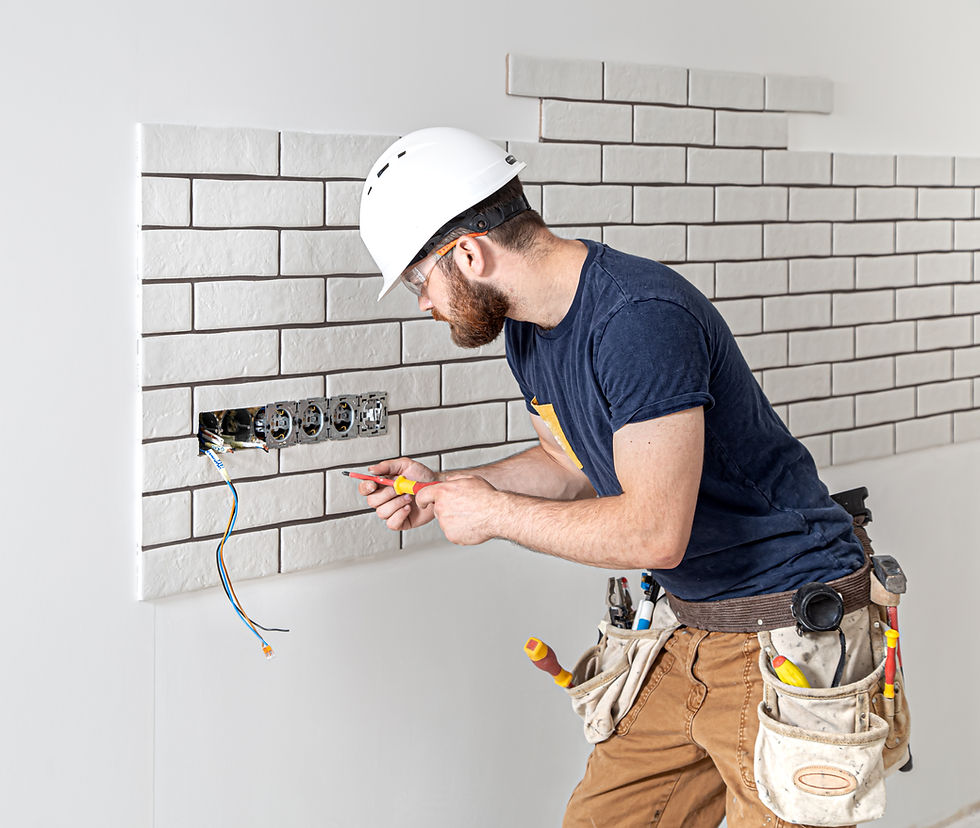How Electrical Engineers Improve Energy Efficiency in Buildings
- John Shaw
- Feb 26, 2025
- 4 min read
As the demand for energy continues to rise, improving energy efficiency in buildings has become a priority for both homeowners and businesses. Electrical engineers play a pivotal role in enhancing energy efficiency by designing, implementing, and maintaining electrical systems that reduce energy consumption and optimise performance. These professionals work alongside electricians, electrical contractors, and emergency electricians to ensure that buildings are energy-efficient, cost-effective, and environmentally friendly. In this blog, we will explore how electrical engineers improve energy efficiency in buildings and the key steps involved in achieving these goals.

The Role of Electrical Engineers in Improving Energy Efficiency
Electrical engineers are experts in designing and managing electrical systems that ensure optimal energy usage within buildings. Their focus is on creating energy-efficient solutions that help minimise wastage, lower costs, and reduce the environmental impact of energy consumption. Through their expertise, electrical engineers help buildings become more sustainable by integrating renewable energy sources, optimising lighting systems, improving insulation, and installing energy-efficient appliances.
1. Energy-Efficient Lighting Systems
One of the primary ways electrical engineers improve energy efficiency in buildings is through the design and installation of energy-efficient lighting systems. Lighting consumes a significant amount of energy in both residential and commercial buildings. By using LED lights, motion sensors, and smart lighting systems, electrical engineers help to drastically reduce energy consumption.
LED lights, for example, use far less energy than traditional incandescent bulbs and have a much longer lifespan. Motion sensors ensure that lights are only on when needed, further reducing energy usage. Electrical engineers also integrate advanced controls that allow building owners to adjust lighting levels based on occupancy and time of day, ensuring that energy is used only when necessary.
2. Optimising Heating and Cooling Systems
Heating, ventilation, and air conditioning (HVAC) systems are among the highest energy consumers in buildings. Electrical engineers optimise these systems to improve energy efficiency. They design and install systems that regulate temperature more effectively, ensuring that heating and cooling are used only when required and at the most efficient levels.
By implementing programmable thermostats, zone control systems, and smart sensors, electrical engineers enable buildings to consume energy more efficiently. They also ensure that HVAC systems are well-maintained and operating at peak performance, reducing the need for excessive energy usage and preventing unnecessary energy wastage. Additionally, electrical engineers may recommend upgrading insulation and sealing air leaks to further enhance energy savings.
3. Integrating Renewable Energy Sources
Another key contribution of electrical engineers to energy efficiency is the integration of renewable energy sources, such as solar panels and wind turbines. By incorporating renewable energy technologies into building designs, electrical engineers help reduce reliance on non-renewable energy sources and lower carbon footprints.
Solar panels, for example, can provide a building with a significant portion of its electricity, reducing energy costs and reliance on the grid. Electrical engineers ensure that these systems are correctly installed and integrated with the building's electrical infrastructure, allowing for efficient energy generation and use. They also design energy storage systems to store excess energy for use during non-sunny periods, further increasing energy efficiency.
4. Energy Monitoring and Control Systems
Electrical engineers also play a key role in the installation and optimisation of energy monitoring and control systems. These systems track and analyse energy consumption patterns within a building, providing insights into areas where energy is being wasted. By using real-time data, electrical engineers can identify inefficiencies and recommend adjustments to improve energy use.
Smart meters, energy dashboards, and automated controls are some of the tools electrical engineers employ to monitor energy consumption. They help building owners understand their energy usage and make informed decisions about how to reduce wastage. In commercial buildings, energy management systems can automatically adjust lighting, heating, and cooling based on occupancy and external conditions, resulting in significant energy savings.
The Collaboration of Electrical Engineers with Other Professionals
While electrical engineers are key to improving energy efficiency, their work often involves close collaboration with other professionals, such as electricians, electrical contractors, and emergency electricians. Together, they ensure that energy-efficient solutions are designed, installed, and maintained to the highest standards.
1. Working with Electricians
Electricians are responsible for installing and wiring the energy-efficient systems designed by electrical engineers. They ensure that electrical systems, such as lighting, HVAC controls, and renewable energy technologies, are properly connected and functioning. Electricians follow the specifications provided by electrical engineers to ensure that installations comply with safety standards and are energy-efficient.
2. Electrical Contractors and System Implementation
Electrical contractors oversee larger projects that involve the installation of energy-efficient systems in buildings. They manage the coordination between electrical engineers, electricians, and other professionals involved in the project. Their role is critical in ensuring that all components are installed according to the design specifications and that the building's electrical system meets energy efficiency goals.
3. Emergency Electricians and Ongoing Maintenance
An emergency electrician plays a key role in maintaining the energy-efficient systems installed in buildings. Should any system malfunction or require urgent repairs, emergency electricians are available to address the issue promptly. By responding quickly to system failures, emergency electricians help maintain the building’s energy efficiency and prevent unnecessary energy losses.
Conclusion
Electrical engineers play a crucial role in improving energy efficiency in buildings. From designing energy-efficient lighting and HVAC systems to integrating renewable energy sources, these professionals are integral in helping buildings reduce energy consumption and minimise their environmental impact. Their collaboration with electricians, electrical contractors, and emergency electricians ensures that energy-efficient systems are properly installed, maintained, and optimised.
By focusing on energy efficiency, electrical engineers not only help building owners save on energy costs but also contribute to a more sustainable future. With the increasing demand for energy-efficient solutions, electrical engineers will continue to play a vital role in shaping the future of energy use in buildings, creating smarter, greener, and more cost-effective environments for everyone.



Comments